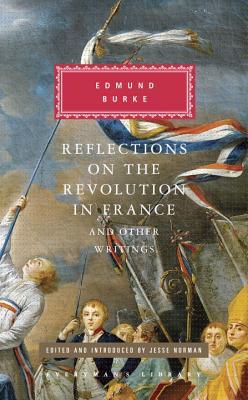- Biblia
- Leer la Biblia
- Versiones de la Biblia
- Verso del dia
- Planes de lectura
- Versos por tema
- Books of the Bible
- Imágenes De La Biblia
- Estudio
- Comentarios
- Concordancias
- Diccionarios bíblicos
- Enciclopedias bíblicas
- Sermones
- Bible Atlas & Maps
- BP Wiki
- Devocionales
- Devocionales de hoy
- Light of the World
- Todos los devocionales
- Inspirational Quotes
- Más
- Picture Quotes
- Videos
- Inspirador
- Estudio Bíblico
- Lo que dice la Biblia
- Bible Q&As
- Daily Bread
- Bible by Genre
- Bible Stories
- Random Bible Verse
- Comunidad
- Store
Reflections on the Revolution in France and Other Writings
by Edmund Burke
The most important works of Edmund Burke, the greatest political thinker of the past three centuries, are gathered here in one comprehensive volume. Accompanying his influential masterpiece, Reflections on the Revolution in FranceReflections on the Revolution in France, is a selection of pamphlets, speeches, public letters, private correspondence and, for the first time, two important and previously uncollected early essays.
Philosopher, statesman, and founder of conservatism, Burke was a dazzling orator and a visionary theorist who spent his long political career fighting abuses of power. He wrote at a time of great change, against the backdrop of the revolt of the American colonies, the expansion of the British Empire, the collapse of Ireland, and the French Revolution. Burke argued passionately in support of the American revolutionaries and in equally impassioned opposition to the horrors of the unfolding French Revolution. Making a case for upholding established rights and customs, and advocating incremental reform rather than radical revolutionary change, Burke’s writings have profoundly influenced modern democracies up to the present day.
Edited and Introduced by Jesse Norman.
Philosopher, statesman, and founder of conservatism, Burke was a dazzling orator and a visionary theorist who spent his long political career fighting abuses of power. He wrote at a time of great change, against the backdrop of the revolt of the American colonies, the expansion of the British Empire, the collapse of Ireland, and the French Revolution. Burke argued passionately in support of the American revolutionaries and in equally impassioned opposition to the horrors of the unfolding French Revolution. Making a case for upholding established rights and customs, and advocating incremental reform rather than radical revolutionary change, Burke’s writings have profoundly influenced modern democracies up to the present day.
Edited and Introduced by Jesse Norman.
BUY NOW
Hardcover, 1160 pages
Published November 3rd 2015 by Everyman's Library (first published October 7th 2014)
Suscribir
© 2025 Bibleportal.com Reservados todos los derechos.

Edmund Burke, was born in Dublin, January 12, educated at a Quaker boarding school and at Trinity College, Dublin. In 1750 he entered the Middle Temple, London, but soon abandoned law for literary work.
The best of Burke's writings and speeches belong to this period, and may be described as a defense of sound constitutional statesmanship against prevailing abuse and misgovernment. In 1788 he opened the trial of Warren Hastings by the speech which will always rank among the masterpieces of English eloquence.
Burke had vast knowledge of political affairs, a glowing imagination, passionate sympathies, and an inexhaustible wealth of powerful and cultured expression. However, his delivery was awkward and speeches which today captivate the reader only served to empty the benches of the House of Commons (some speeches were in excess of eight hours).
One of the foremost political thinkers of 18th century England, Burke died July 9, 1797, and was buried in a little church at Beaconsfield.
... Show more